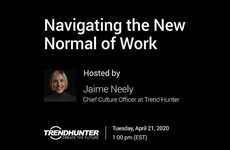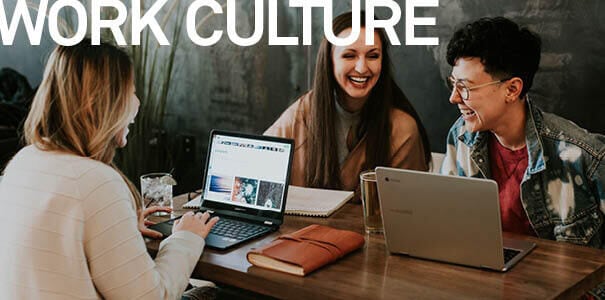Reinventing Employeecentricity
Jaime Neely — September 13, 2021 — Business
The ongoing crisis of the pandemic means that much of the future remains unclear, but it can be said with certainty that the workplace is forever changed. Not only have we experienced the viability of remote work over the past 18 months, we’ve had the opportunity to completely redefine work-life balance. We’ve also had time to reflect on what really matters to us in our lives. Many are realizing there is more to life than work and are prioritizing their well-being, mental health and family over the “rise and grind” mindset that had been normalized in a pre-pandemic world.
This shift in perspective -- especially among younger employees -- demands more flexibility from employers as the world emerges from the pandemic and offices open up again. We are entering an era in which employers must recognize the unique needs and preferences of employees, and also accept the role they play in maintaining employee well-being. Employers must take an employee-centric approach if they want to retain and recruit top talent.
I explore employeecentricity -- and how you can cultivate it among your team -- in my upcoming Future Festival Work Culture Keynote. Through case studies and data-driven insights, I’ll discuss the changing preferences of employees today and how companies can adapt to remain competitive as an employer and emerge from the pandemic as a more resilient organization. Some of these include:
Flexible Work: Employers must offer more flexibility as Millennial and Gen Z employees bring new expectations and norms into the workplace.
Outdoor Offices: The pandemic has led many companies to reinvent their workspaces to accommodate safety and reimagined collaboration.
Virtualized Onboarding: Companies and brands are using technology to create a seamless and connected onboarding experience for new employees.
Fertility Benefits: Companies are recognizing the importance of being more inclusive with the benefits they offer employees, including support in starting a family.
These are just a preview of the topics and examples I’ll discuss during my work culture presentation on Day 2 of Trend Hunter’s virtual Future Festival later this month. If you haven’t already registered for a PRO ticket, you still have time. The event will include other trend keynotes on the future of retail, leisure and social media.
This shift in perspective -- especially among younger employees -- demands more flexibility from employers as the world emerges from the pandemic and offices open up again. We are entering an era in which employers must recognize the unique needs and preferences of employees, and also accept the role they play in maintaining employee well-being. Employers must take an employee-centric approach if they want to retain and recruit top talent.
I explore employeecentricity -- and how you can cultivate it among your team -- in my upcoming Future Festival Work Culture Keynote. Through case studies and data-driven insights, I’ll discuss the changing preferences of employees today and how companies can adapt to remain competitive as an employer and emerge from the pandemic as a more resilient organization. Some of these include:
Flexible Work: Employers must offer more flexibility as Millennial and Gen Z employees bring new expectations and norms into the workplace.
Outdoor Offices: The pandemic has led many companies to reinvent their workspaces to accommodate safety and reimagined collaboration.
Virtualized Onboarding: Companies and brands are using technology to create a seamless and connected onboarding experience for new employees.
Fertility Benefits: Companies are recognizing the importance of being more inclusive with the benefits they offer employees, including support in starting a family.
These are just a preview of the topics and examples I’ll discuss during my work culture presentation on Day 2 of Trend Hunter’s virtual Future Festival later this month. If you haven’t already registered for a PRO ticket, you still have time. The event will include other trend keynotes on the future of retail, leisure and social media.
Trend Themes
1. Flexible Work - Employers must adapt to the changing expectations and norms of Millennial and Gen Z employees by offering more flexibility, presenting an opportunity for innovation in the creation of new remote work policies and technology solutions.
2. Outdoor Offices - The pandemic has sparked the need for companies to reimagine their workspaces to accommodate safety and collaboration needs, creating an opportunity for innovation in outdoor workspaces and technology solutions that support hybrid models.
3. Virtualized Onboarding - The adoption of technology to create a seamless onboarding experience for new employees presents an opportunity for innovation in virtual reality and augmented reality solutions, as well as remote communication and collaboration tools.
Industry Implications
1. Technology - With the increasing need for remote work policies and virtualized onboarding solutions, technology providers have the opportunity to create innovative solutions in virtual and augmented reality, remote communication and collaboration tools, and security solutions.
2. Real Estate - The shift towards outdoor offices creates an opportunity for innovation in outdoor workspaces, as well as repurposing existing real estate spaces to meet the changing needs of businesses.
3. Healthcare - As companies recognize the importance of being more inclusive with the benefits they offer employees, including fertility support, healthcare providers have the opportunity to innovate and offer new solutions in reproductive healthcare benefits.
4.5
Score
Popularity
Activity
Freshness






















